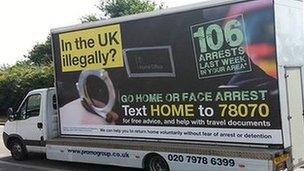Theresa May says 'go home' will not be rolled out across UK
- Published

The adverts contained inaccurate arrest figures, the Advertising Standards Authority said
Theresa May has said vans telling illegal immigrants to "go home" or face arrest will not be rolled out across the UK.
A trial of the controversial vans in London is still being evaluated.
But the home secretary told MPs she accepted they had "not been a good idea" and were too much of a "blunt instrument".
Labour said Mrs May must take responsibility for the "complete failure" of the policy.
Explaining her decision to ditch the campaign in the Commons, the home secretary said: "What I've done is looked at the interim evaluation in relation to the plans - and there were some returns achieved as a result of that.
"Politicians should be willing to step up to the plate and say when they think something actually hasn't been as good an idea, and I think they were too blunt an instrument."
'Stupid'
Theresa May said the vans were "too blunt an instrument"
But she defended government attempts to tighten up immigration enforcement when people overstay their visas, which she said had resulted in "something around 4,000 people leaving the UK".
The government pilot, which saw vans driving around parts of London for a week in July, drew criticism from across the political spectrum.
Liberal Democrat Business Secretary Vince Cable described the campaign as "stupid" while UKIP said the scheme was "disturbing" and reminiscent of a fascist dictatorship.
The vans were also criticised by the Advertising Standards Authority, which said the arrest statistics on them were misleading, although the watchdog cleared the campaign of being offensive and irresponsible.
'Divisive gimmick'
During the campaign, the vans drove around the London boroughs of Barking and Dagenham, Redbridge, Barnet, Brent, Ealing and Hounslow - all ethnically diverse areas where it is thought a lot of illegal immigrants live and work.
The poster displayed a picture of handcuffs and read: "In the UK illegally? Go home or face arrest."
Home Office ministers insisted the pilot had worked - and they were considering extending it elsewhere.
Speaking earlier this month, Police Minister Damian Green said the "hard-hitting" campaign had "let people know that 'the traditional view that if you have been here illegally nothing would happen to you' is not the case".
The Lib Dems say they were not consulted about the idea and would have opposed it had they known, and party president Tim Farron has suggested they should take credit for not allowing it to go any further.
"This is a failed project and the Home Office should hold their hands up and admit it was wrong both practically and morally," he said.
But Labour said it "beggared belief" that the Lib Dems were trying to "claim victory for ending a policy that they signed off in the first place".
FOI request
Shadow home secretary Yvette Cooper said her Conservative counterpart must take responsibility for the "complete failure" of the idea.
"You agreed to that slogan," she said during heated exchanges in the Commons.
"And you agreed to send it round communities whose parents heard it from the National Front in the 1970s and whose British citizens work in our public services, build our businesses and fight in our armed forces today.
"You signed this policy off, you defended it, all for the sake of one person returning. You should be better than that. I hope you are ashamed of what you did.
"You should confirm that you will never pursue such divisive gimmicks again. It is beneath you and it ought to be beneath this government."
Conservative MP Henry Smith told the BBC's Daily Politics it had been an idea "worth looking at" but it had been practically flawed and made "people less willing to report if they were in the country illegally rather than more willing".
A request by the BBC to see the Home Office's initial evaluation of the pilot has been turned down.
The BBC's home affairs correspondent Dominic Casciani requested information about the response to the ad campaign, under Freedom of Information laws.
But he was told the details were intended for "future publication" and therefore were exempt from disclosure rules. It is not clear when the study will be published.
- Published22 October 2013
- Published22 October 2013
- Published9 October 2013
- Published18 September 2013